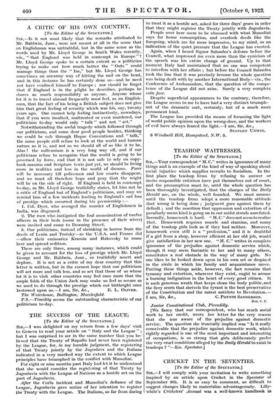TEASHOP WAITRESSES.
[To the Editor of the SPECTATOR.] Sin,—Your correspondent " M. C." writes in ignorance-of many things and is an example of the kind of way of speaking about social injustice which supplies recruits to Socialism. In the first place the teashop firms by refusing to answer or invite responsible criticism have put themselves out of court, and the presumption must be, until the whole question has been thoroughly investigated, that the charges of the Daily Herald are, on the whole, well founded. We must assume until the teashop firms adopt a more reasonable attitude that wrong is being done ; judgment goes against them by default ; and the assertion that oppression and extortion of a peculiarly mean kind is going on in our midst stands unrefuted. Secondly, housework is hard. " M. C." does not seem to realize that. Housework requires muscle and stamina, and many of the teashop girls look as if they had neither. Moreover, housework even still is a " profession," and it is doubtful if a girl from a shop, however efficient at her old job, would give satisfaction in her new one. "M. C." writes in complete ignorance of the prejudice against domestic service which, though it may seem fantastic to her and to many others, constitutes a real obstacle in the way of many girls. No one likes to be looked down upon in his own set or despised in the circle in which his family and acquaintance move. Putting these things aside, however, the fact remains that tyranny and extortion, wherever they exist, ought to arouse a burning indignation in the heart of every good citizen. It is such generous wrath that keeps clean the body politic, and the fiery scorn that shrivels the tyrant is the best preservative of the Constitution and the surest antidote to Revolution.—
Hon. C. F.
Junior Constitutional Club, Piccadilly.
[We fancy that our correspondent, who has much social work to her credit, wrote her letter for the very reason that she was aware of the prejudice against domestic service. The question she ironically implied was "Is it really conceivable that the prejudice against domestic work, which rightly regarded is one of the most important and interesting of occupations, is so strong that girls deliberately prefer the very cruel conditions alleged by the Daily Herald to exist in teashops ? "—En. Spectator.]










































 Previous page
Previous page